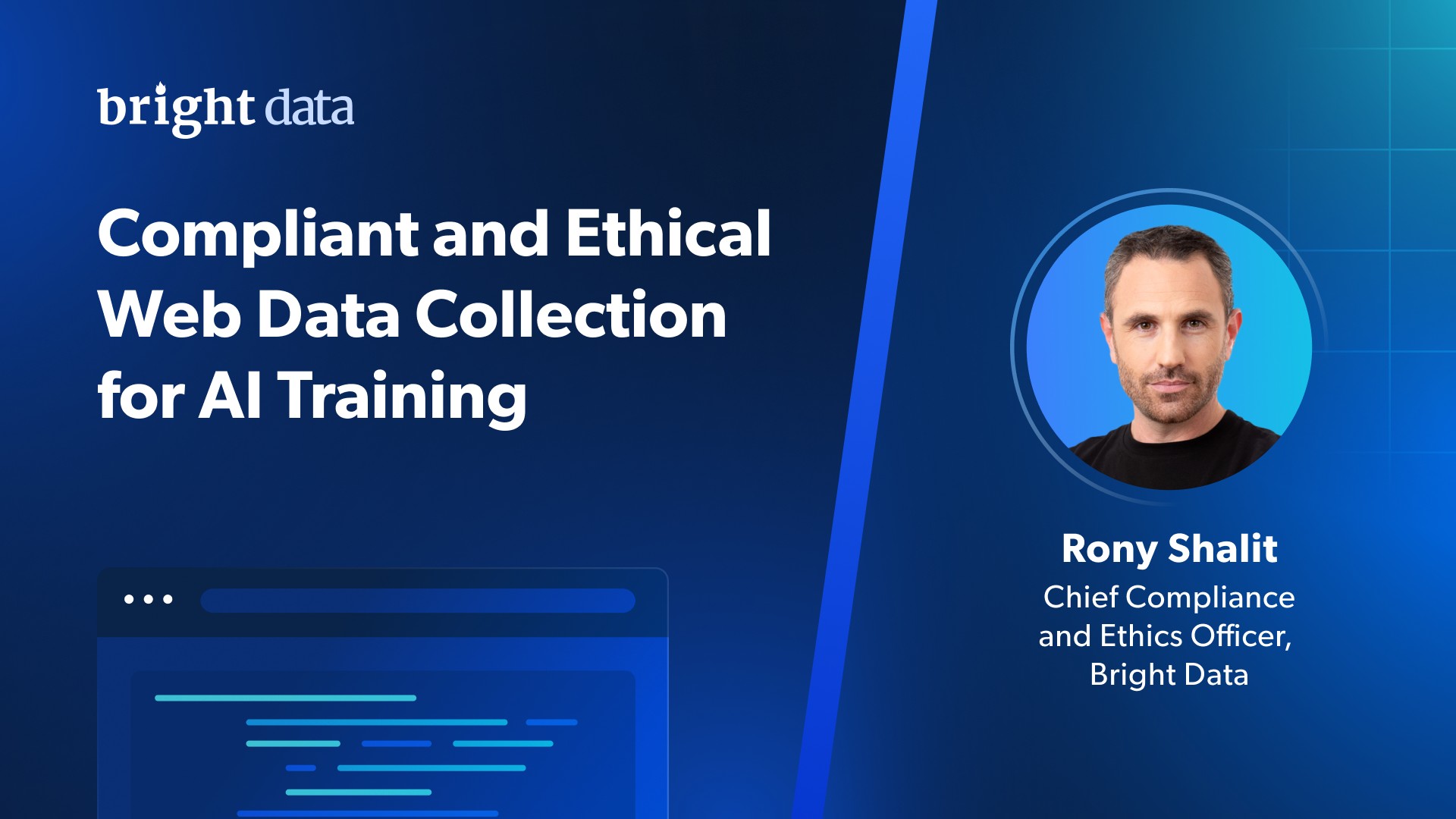In today’s data-driven economy, web scraping plays a vital role in powering innovation—especially in artificial intelligence (AI). At Bright Data, we’ve spent over a decade helping organizations across industries collect and use web data responsibly. As AI adoption accelerates, ethical web scraping has become more important than ever.
This blog post outlines key takeaways from a recent webinar on ethical web data collection. We’ll explore the risks, best practices, and evolving regulatory landscape that every organization should understand.
Note: This article is not legal advice. Regulations vary by jurisdiction and are evolving rapidly. Always consult your legal team.
Why Ethical Web Scraping Matters
The demand for data is growing exponentially, particularly in AI development. However, this demand has outpaced the development of clear regulatory frameworks, creating confusion and risk.
Three Key Challenges:
- Lack of Clear Guidance: No universal rules exist for web scraping. Legal interpretations vary by country and court.
- Ongoing Legal Disputes: New lawsuits and government actions emerge regularly.
- Ethical Uncertainty: Many organizations struggle to define what ethical scraping looks like.
To build a sustainable AI infrastructure, organizations must understand and implement ethical data collection practices.
The Risks of Web Scraping
Web scraping carries two main categories of risk:
1. Legal, Reputational, and Financial Risks
- Lawsuits from website owners or third parties
- Regulatory penalties for violating privacy or copyright laws
- Negative media coverage damaging brand reputation
A recent example involved a data vendor offering LinkedIn data that included non-public information. The vendor was sued and shut down, leaving customers to assess the impact on their AI models.
2. Technical Risks
- IP bans or blocked access due to aggressive scraping
- Poor data quality and availability
- Ingestion of non-compliant data into AI models
Core Principles of Ethical Web Scraping
To mitigate these risks, organizations should follow a set of best practices:
1. Collect Only Public Web Data
Only collect data that is publicly accessible without login credentials, paywalls, or other restrictions. Be prepared to demonstrate how you distinguish between public and non-public data.
2. Purpose-Driven Collection
Collect only the data necessary for a specific, legitimate business purpose. Align your scraping activities with your organizational goals.
3. Protect the Web
Ensure your scraping activities do not degrade website performance. Use tools like domain response time monitoring to detect and mitigate impact.
4. Maintain Logs
Keeping logs is essential for ethical scraping. Logs help monitor activity, investigate issues, and defend against false accusations. Avoid vendors who refuse to keep logs under the guise of protecting customers.
5. Governance and Reporting
Establish internal and external mechanisms for reporting and addressing non-compliant activity. Conduct third-party audits to ensure adherence to your policies.
The Regulatory Landscape
Regulations around data collection and AI are evolving rapidly, with different approaches across regions:
European Union
- EU AI Act: A risk-based approach that prioritizes ethics and safety.
- Voluntary Code of Practice: Encourages self-regulation among AI companies, though adoption is mixed.
United States
- AI Action Plan: Focuses on innovation and access to public data, leaving ethical concerns to be resolved in court.
China
- Global AI Initiative: Another emerging framework with its own set of rules.
Regardless of geography, regulators are increasingly focused on how data is collected—not just how it is used.
Practical Checklist for Ethical Web Scraping
Use this checklist to guide your data collection strategy:
Know Your Data Sources
- Work only with reputable vendors who provide publicly available data.
- Understand how your vendors collect and process information.
Protect the Web
- Implement rate limits and health monitoring.
- Avoid overloading websites with automated traffic.
Keep Logs
- Maintain detailed logs of scraping activity for compliance and troubleshooting.
Enable Reporting
- Create channels for internal and external stakeholders to report issues.
- Investigate and act on abnormal activity.
Stay Informed
- Monitor regulatory developments and court rulings.
- Regularly consult with your legal team.
Join Industry Initiatives
- Participate in alliances like the Alliance for Responsible Data Collection (ARDC) to promote ethical standards across the industry.
The Role of the ARDC
The Alliance for Responsible Data Collection (ARDC) is a cross-industry initiative that promotes ethical web scraping practices. Through collaboration, technical standards, and shared knowledge, the ARDC helps ensure that public data remains accessible and responsibly used.
Bright Data is proud to be part of this effort, and we invite others to join us. Visit the ARDC website to learn more and get involved:
https://www.responsibledata.org
Final Thoughts
Ethical web scraping is not just a compliance requirement—it’s a strategic advantage. As AI continues to evolve, the quality, legality, and ethics of your data sources will determine the success and sustainability of your solutions.
By focusing on transparency, responsibility, and collaboration, we can ensure that public data remains a valuable resource for innovation—used ethically and for the greater good.
Let’s keep the web open, the data public, and the practices ethical.














